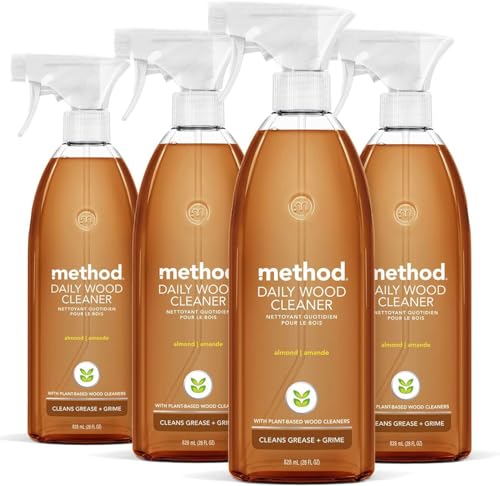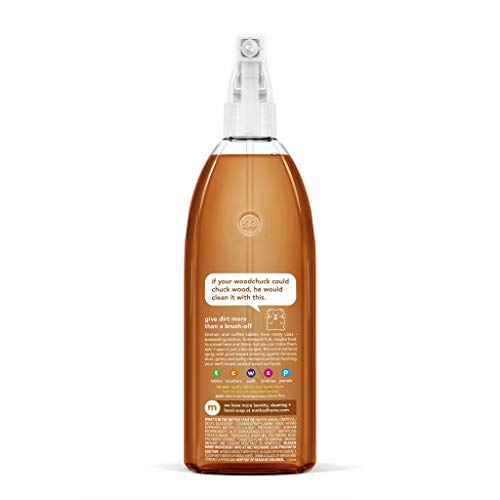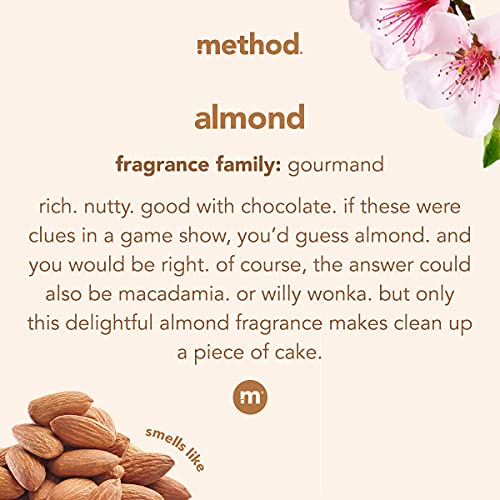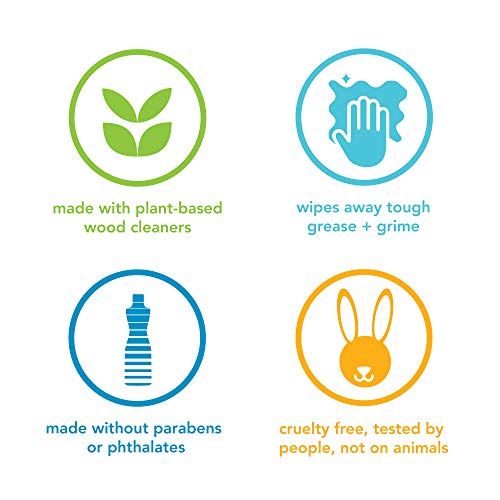






Method Daily Hardwood Cleaner - Plant-Based Dust & Grime Remover, Almond Scent - 4 x 28oz


Methylisothiazolinone
High RiskMethylisothiazolinone is a widely-used preservative in cosmetic and personal care products, known for its antimicrobial properties. It helps prevent the growth of bacteria and fungi, extending the shelf life of formulations. It is often used in leave-on and rinse-off products, including lotions and shampoos.
Sustai Insights
Methylisothiazolinone serves as an effective preservative, combating microbial growth in various personal care items. However, it is associated with a high risk of allergic reactions and skin sensitization, especially in individuals exposed repeatedly. Regulatory bodies have imposed use restrictions due to these health concerns. Additionally, while it is not considered a carcinogen, its environmental impact includes potential pollutant characteristics. Overall, the risk associated with methylisothiazolinone is high, prompting caution and consideration of safer alternatives.
Fragrance
High RiskFragrance refers to a mixture of aromatic compounds used in products to provide scent. It is commonly listed as 'fragrance' or 'parfum' on product labels and can serve various functions, including enhancing user experience and masking undesirable odors.
Sustai Insights
Fragrance offers functional benefits by improving product appeal; however, it poses significant health risks, notably a high likelihood of causing allergies and allergic contact dermatitis. Environmental risks include potential pollution and endocrine disruption, though its overall carcinogenicity is low. Regulatory bodies have noted concerns regarding its use, leading to a high-risk classification. Safe usage practices should be observed, and alternatives such as natural essential oils are recommended for those sensitive to synthetic fragrances.
Dimethicone
Medium RiskDimethicone, also known as polymethylsiloxane, is a silicone-based polymer commonly used in personal care products for its smooth application and skin conditioning properties. It acts primarily as an emollient, providing a silky feel while forming a protective barrier on the skin.
Sustai Insights
Dimethicone provides functional benefits as an effective emollient and skin protectant, contributing to product stability and sensory attributes. It is considered low risk for carcinogenicity, allergies, and reproductive toxicity, but has moderate usage restrictions due to environmental persistence and bioaccumulation concerns. Regulatory bodies have issued advisories regarding its use in certain formulations. Overall, its risk level is assessed as medium, and users are advised to follow recommended usage practices. Alternatives like natural oils or butters may offer sustainable options.
Oleic Acid
Low RiskOleic acid is a naturally occurring fatty acid commonly found in various plant oils. It serves multiple functions in cosmetic and food products, including acting as an emollient, emulsifier, and a moisturizer, enhancing the texture and stability of formulations.
Sustai Insights
Oleic acid is beneficial for skin absorption and serves as an effective emollient, helping to maintain moisture levels. It is biodegradable and often sustainably sourced. Health risks are minimal, with low concerns regarding carcinogenicity, allergies, or reproductive toxicity. Environmental risks are also low, with no significant pollutant or bioaccumulation concerns noted. Regulatory bodies have not issued major warnings or restrictions. Overall, oleic acid is considered low risk, making it a suitable ingredient in various applications.
Potassium Oleate
Low RiskPotassium oleate is a potassium salt of oleic acid, commonly used as an emulsifier and surfactant in various personal care and cosmetic products. It assists in stabilizing formulations by reducing surface tension and promoting the mixing of oil and water components.
Sustai Insights
Potassium oleate is effective as an emulsifier, enhancing product stability and texture. It is biodegradable and can be sustainably sourced. Health risks are low, with minimal concerns regarding carcinogenicity, allergies, or reproductive toxicity. Environmental risks are also low, as it does not contribute significantly to pollution or bioaccumulation. Regulatory bodies impose few restrictions. Safe usage practices should include adhering to recommended concentrations. Overall, potassium oleate presents a low risk profile in cosmetic applications.
Water
Low RiskWater is a clear, colorless liquid essential for various biological processes. It serves as a solvent in formulations, facilitating the dissolution of other ingredients and enhancing product texture and application. Additionally, water plays a crucial role in hydration and is a key component in many cosmetic and personal care products.
Sustai Insights
Water is an effective solvent and hydrator, contributing to the texture and efficacy of formulations. It is biodegradable and generally regarded as safe, with low concerns regarding carcinogenicity, allergies, and reproductive toxicity. However, excessive water usage can lead to environmental concerns, particularly regarding resource depletion. Regulatory bodies do not impose restrictions on water use in cosmetics. Overall, the risks associated with water are low, making it a safe and essential ingredient.
Vegetarian Glycerin
Low RiskVegetarian glycerin, also known as glycerol, is a colorless, odorless, and viscous liquid derived from plant sources. It is primarily used as a humectant, solvent, and emollient in various personal care products, helping to retain moisture and improve texture.
Sustai Insights
Vegetarian glycerin offers functional benefits as an effective humectant, promoting hydration and skin smoothness. It is biodegradable and typically sustainably sourced. Health risks associated with glycerin are low, with no significant concerns for carcinogenicity, allergens, or reproductive toxicity. Environmental risks are minimal, and it is not subject to major regulatory warnings. Overall, the risk level for this ingredient is low, making it a safe choice in formulations. Safe usage practices include ensuring proper concentrations in products, and alternatives such as propylene glycol exist but may have differing properties.
Peg 55
Low RiskPEG-55 is a polymer of ethylene oxide commonly used as a surfactant and emulsifier in cosmetic and personal care products. It helps to improve the texture and stability of formulations by aiding in the mixing of oil and water-based ingredients.
Sustai Insights
PEG-55 offers functional benefits as an effective emulsifier, enhancing product performance. It has a low risk of health concerns, including carcinogenicity, allergies, and reproductive toxicity, and is not associated with significant environmental hazards. Regulatory bodies have not imposed serious restrictions on its use. Overall, it presents a low risk, making it a viable ingredient in formulations. Safe usage practices should be followed, and alternatives like plant-based emulsifiers may be considered for increased sustainability.
Dimethicone
Medium RiskDimethicone, also known as polymethylsiloxane, is a silicone-based polymer commonly used in personal care products for its smooth application and skin conditioning properties. It acts primarily as an emollient, providing a silky feel while forming a protective barrier on the skin.
Sustai Insights
Dimethicone provides functional benefits as an effective emollient and skin protectant, contributing to product stability and sensory attributes. It is considered low risk for carcinogenicity, allergies, and reproductive toxicity, but has moderate usage restrictions due to environmental persistence and bioaccumulation concerns. Regulatory bodies have issued advisories regarding its use in certain formulations. Overall, its risk level is assessed as medium, and users are advised to follow recommended usage practices. Alternatives like natural oils or butters may offer sustainable options.
Oleic Acid
Low RiskOleic acid is a naturally occurring fatty acid commonly found in various plant oils. It serves multiple functions in cosmetic and food products, including acting as an emollient, emulsifier, and a moisturizer, enhancing the texture and stability of formulations.
Sustai Insights
Oleic acid is beneficial for skin absorption and serves as an effective emollient, helping to maintain moisture levels. It is biodegradable and often sustainably sourced. Health risks are minimal, with low concerns regarding carcinogenicity, allergies, or reproductive toxicity. Environmental risks are also low, with no significant pollutant or bioaccumulation concerns noted. Regulatory bodies have not issued major warnings or restrictions. Overall, oleic acid is considered low risk, making it a suitable ingredient in various applications.
Methylisothiazolinone
High RiskMethylisothiazolinone is a widely-used preservative in cosmetic and personal care products, known for its antimicrobial properties. It helps prevent the growth of bacteria and fungi, extending the shelf life of formulations. It is often used in leave-on and rinse-off products, including lotions and shampoos.
Sustai Insights
Methylisothiazolinone serves as an effective preservative, combating microbial growth in various personal care items. However, it is associated with a high risk of allergic reactions and skin sensitization, especially in individuals exposed repeatedly. Regulatory bodies have imposed use restrictions due to these health concerns. Additionally, while it is not considered a carcinogen, its environmental impact includes potential pollutant characteristics. Overall, the risk associated with methylisothiazolinone is high, prompting caution and consideration of safer alternatives.
Potassium Oleate
Low RiskPotassium oleate is a potassium salt of oleic acid, commonly used as an emulsifier and surfactant in various personal care and cosmetic products. It assists in stabilizing formulations by reducing surface tension and promoting the mixing of oil and water components.
Sustai Insights
Potassium oleate is effective as an emulsifier, enhancing product stability and texture. It is biodegradable and can be sustainably sourced. Health risks are low, with minimal concerns regarding carcinogenicity, allergies, or reproductive toxicity. Environmental risks are also low, as it does not contribute significantly to pollution or bioaccumulation. Regulatory bodies impose few restrictions. Safe usage practices should include adhering to recommended concentrations. Overall, potassium oleate presents a low risk profile in cosmetic applications.
Water
Low RiskWater is a clear, colorless liquid essential for various biological processes. It serves as a solvent in formulations, facilitating the dissolution of other ingredients and enhancing product texture and application. Additionally, water plays a crucial role in hydration and is a key component in many cosmetic and personal care products.
Sustai Insights
Water is an effective solvent and hydrator, contributing to the texture and efficacy of formulations. It is biodegradable and generally regarded as safe, with low concerns regarding carcinogenicity, allergies, and reproductive toxicity. However, excessive water usage can lead to environmental concerns, particularly regarding resource depletion. Regulatory bodies do not impose restrictions on water use in cosmetics. Overall, the risks associated with water are low, making it a safe and essential ingredient.
Fragrance
High RiskFragrance refers to a mixture of aromatic compounds used in products to provide scent. It is commonly listed as 'fragrance' or 'parfum' on product labels and can serve various functions, including enhancing user experience and masking undesirable odors.
Sustai Insights
Fragrance offers functional benefits by improving product appeal; however, it poses significant health risks, notably a high likelihood of causing allergies and allergic contact dermatitis. Environmental risks include potential pollution and endocrine disruption, though its overall carcinogenicity is low. Regulatory bodies have noted concerns regarding its use, leading to a high-risk classification. Safe usage practices should be observed, and alternatives such as natural essential oils are recommended for those sensitive to synthetic fragrances.
Vegetarian Glycerin
Low RiskVegetarian glycerin, also known as glycerol, is a colorless, odorless, and viscous liquid derived from plant sources. It is primarily used as a humectant, solvent, and emollient in various personal care products, helping to retain moisture and improve texture.
Sustai Insights
Vegetarian glycerin offers functional benefits as an effective humectant, promoting hydration and skin smoothness. It is biodegradable and typically sustainably sourced. Health risks associated with glycerin are low, with no significant concerns for carcinogenicity, allergens, or reproductive toxicity. Environmental risks are minimal, and it is not subject to major regulatory warnings. Overall, the risk level for this ingredient is low, making it a safe choice in formulations. Safe usage practices include ensuring proper concentrations in products, and alternatives such as propylene glycol exist but may have differing properties.
Peg 55
Low RiskPEG-55 is a polymer of ethylene oxide commonly used as a surfactant and emulsifier in cosmetic and personal care products. It helps to improve the texture and stability of formulations by aiding in the mixing of oil and water-based ingredients.
Sustai Insights
PEG-55 offers functional benefits as an effective emulsifier, enhancing product performance. It has a low risk of health concerns, including carcinogenicity, allergies, and reproductive toxicity, and is not associated with significant environmental hazards. Regulatory bodies have not imposed serious restrictions on its use. Overall, it presents a low risk, making it a viable ingredient in formulations. Safe usage practices should be followed, and alternatives like plant-based emulsifiers may be considered for increased sustainability.
Transform your cleaning routine with Method Daily Hardwood Cleaner, featuring a plant-based formula that is tough on dust and grime yet gentle on your beloved wooden surfaces. The delightful almond scent adds a touch of luxury to your chores while promoting a healthier home environment.
- Effective Cleaning: This cleaner easily removes dust and grime from wood tables, counters, and shelves without damaging their finish.
- Plant-Based Ingredients: Made from thoughtful, plant-based ingredients, ensuring a clean that is safe for your family and pets.
- Sustainable Packaging: Each bottle is crafted from 100% recycled plastic, supporting eco-friendly practices and reducing waste.
- Cruelty-Free: Tested by people, not on animals, affirming a commitment to ethical practices.
- Pleasant Fragrance: Enjoy the rich, nutty aroma of almond while you clean, making your space feel fresh and inviting.
Experience the perfect blend of effectiveness and sustainability with Method Daily Hardwood Cleaner, a choice you can feel good about.
Subscribe & Save with Sustai
- Best Price Guarantee: Always enjoy the lowest prices on sustainable home essentials.
- No Surprises: We’ll notify you before shipping. No hidden fees, ever.
- You’re in Charge: Change, pause, or cancel your subscription anytime with ease.
- Eco-Friendly Deliveries: Our grouped shipments mean less packaging and lower emissions.
Join us on a sustainable journey. Special offers for a limited time! Prices and promotions may change.
Recommended Products
Transform your cleaning routine with Method Daily Hardwood Cleaner, featuring a plant-based formula that is tough on dust and grime yet gentle on your beloved wooden surfaces. The delightful almond scent adds a touch of luxury to your chores while promoting a healthier home environment.
- Effective Cleaning: This cleaner easily removes dust and grime from wood tables, counters, and shelves without damaging their finish.
- Plant-Based Ingredients: Made from thoughtful, plant-based ingredients, ensuring a clean that is safe for your family and pets.
- Sustainable Packaging: Each bottle is crafted from 100% recycled plastic, supporting eco-friendly practices and reducing waste.
- Cruelty-Free: Tested by people, not on animals, affirming a commitment to ethical practices.
- Pleasant Fragrance: Enjoy the rich, nutty aroma of almond while you clean, making your space feel fresh and inviting.
Experience the perfect blend of effectiveness and sustainability with Method Daily Hardwood Cleaner, a choice you can feel good about.

You can have at most 2 Sustainable Steals products in your cart
Customer Reviews
Customers’ View
Customers appreciate the effectiveness and eco-friendly nature of this hardwood cleaner, highlighting its plant-based formula and pleasant almond scent. Many users commend its cleaning ability, noting that it effectively removes dust and grime without leaving greasy residue. Comments such as 'it keeps my butcher block color nice and vibrant' reflect satisfaction with the product's ability to enhance the appearance of wood surfaces. Additionally, the eco-conscious packaging made from 100% recycled plastic resonates with environmentally aware consumers. However, some customers have reported issues with bottle leakage and inconsistent drying times. Overall, users find this product both effective and aligned with their sustainable lifestyle.
AI-generated from the text of customer reviewsThis product is rated 4.9 of 5.0 stars.
It has received 61 reviews.




